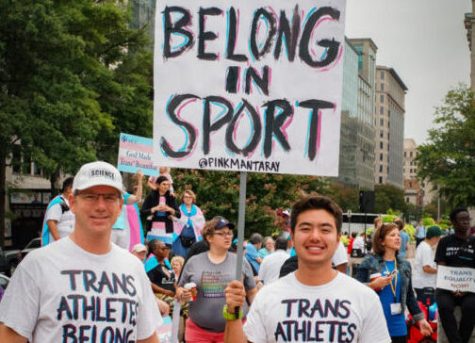A Catholic Response to Gender Identity Theory
Ted Eytan [CC license]
March 10, 2023
How would you react if you were told you couldn’t use the restroom that aligned with your gender? Imagine you weren’t allowed to play on the correct sports team either, and in classes, you were referred to by the wrong name and pronouns. A Catholic Response to Gender Identity Theory advocates that Catholic institutions do precisely that.
Hannah Fransen is a senior at St. Mary’s Academy, a Catholic all-girls high school, and is a co-leader of her school’s Queer Student Union, (QSU). She is also a pride committee member at her church. In 2021, she came out as lesbian.
“A Catholic Response to Gender Identity Theory is a guide to being transphobic, and reading it is upsetting and saddening,” Fransen said. “I am not Catholic, but I do not believe that it is, in any way, accomplishing the Catholic church’s mission to ‘embrace the full human person.’”
The guide was released on Jan 25, 2023, by Portland’s Archbishop, Alexander Sample. The released response to gender theory stated, “The Catholic understanding of the human person is at odds with ‘gender identity theory,’ a framework that is increasingly dominant in Western Culture. According to this model, one’s identity as a man, woman or both/neither is based solely on subjective self-perception.”
The Catholic understanding of the human person is provided in Genesis, which provides the foundation for Catholic anthropology. In the Catholic faith, it is believed that Genesis states that humans were created in God’s image and likeness. It also presents the idea that there is an embodied existence.
“One aspect of our embodied existence is sexual difference: maleness and femaleness,” the response also states. “Because of the profound unity of body and soul, one’s nature as a man or woman is rooted in sexed embodiment.”
On page nine there is a list of guidelines for Catholic institutions to follow. These include but are not limited to guidelines for language, facilities, attire, sports and extracurriculars, educational materials and parental involvement. The document goes on to address what should be done instead of these things, emphasizing a focus on whole-person affirmation.
“Admittedly, what I will speak to now is based on my own personal biases, but as a student who’s attended a Catholic school for three years now, I do not believe any of the guidelines the statement presents works to ‘embrace the whole person,’” Fransen said. “Gender identity is a crucial part of every person, and demanding that someone reject this part of themselves in order to be respected is illogical and crude. Embracing the whole person means the whole person, including the complexities of their identity.”
A Catholic Response to Gender Identity Theory doesn’t just contain guidelines and the Catholic view on gender, but it also describes how “dangerous” transitioning is, both socially and medically. Data used to show how dangerous binding/tucking is failed to mention how long the participants had been doing it and the method of binding/tucking that provided these harmful results. While Fransen said that she had yet to thoroughly analyze every source she found, she believed that the evidence provided felt “under-researched and cherry-picked.”
The idea that transitioning medically and/or socially is bad can also be viewed as a reflected bias of the Catholic church’s viewing gender as a God-given quality, and thus transitioning should be considered bad.
“Our bodies may be ‘granted to us by God’ and should therefore not be altered, but how does this argument apply to other medical conditions?” Fransen said. “Should a person diagnosed with appendicitis not receive an appendectomy because they would be altering the body God gave them? If the response to this question is that the appendectomy will save the person’s life and is therefore permissible, then it is still discluding the life-saving capabilities of medical transition.”
Often there is tension between members of the LGBTQIA+ community and religious communities, yet there are also many positive and healthy relationships between religious communities and queer individuals. Fransen’s relationship with her church is a positive one. Some of the first people she came out to besides her family were members of her church.
“I have always felt safe and welcome in that space,” Fransen said. While her church allows and provides the space for her to be herself, she’s had experiences with other churches that haven’t been as positive, telling her that being gay was not a part of “God’s will.”
A Catholic Response to Gender Identity Theory is helping to further distance the two communities. While it seems that St. Mary’s Academy has not implemented the guidelines suggested by the Catholic Church, the threat is ever-present.

Amelia Pham is a freshman at Central Catholic High School. While she hasn’t personally read A Catholic Response to Gender Identity Theory, she has not seen any new guidelines surrounding gender identity and the ability to express it implemented at her school. “Everyone’s allowed to express themselves the way they want and no one really judges,” Pham said.
Even though the guidelines have not been applied at SMA or Central Catholic, there are other schools that will accept and apply these guidelines, and members of the community are left feeling hurt.
Fransen has felt and seen that the atmosphere at her school is very accepting of students. She has felt support from both the students and staff, yet she believes that the institutional policies aren’t always as supportive and accepting.
There is a similar feeling of support at Central Catholic. “I do know that the students at my school do a really good job at standing up for each other,” Pham said. Just a few years ago there was a protest for dress code and students’ voices were able to change the dress code, so I’m positive everyone would do the same if there was something going on with gender identity.” While the students do seem to care, the administration seems to be more neutral, not giving a preference either way.
At SMA, Fransen is working on plans on how to respond, beginning the discussion at her school. “As a QSU leader, we’ve already held meetings to discuss the statement,” Fransen said. “While not every member has read the statement in its entirety, everyone was familiar with it and had at least heard of if not read a part of it. Page nine, which contains the guidelines for Catholic schools, has circulated on social media, with both current students and recent alumni sharing their frustrations.”
The Archdiocese of Portland, Oregon hasn’t been the only one to release responses to gender identity theory. The Catholic Diocese of Des Moines Iowa recently released similar policies at local schools and hospitals.
Trans and non-binary individuals aren’t unaccustomed to having their rights debated and viewed as something political. In recent years, there has been legislation in different states to restrict trans and trans youth’s access to gender-affirming care. There have also been several rules put in place that are meant to restrict and prevent trans athletes, especially women from playing sports.
In 2023, there have been 8 anti-trans bills introduced in Oregon. Whether they will be enacted or not is still pending, yet they threaten trans individuals. Oregon is just one of the 39 states that have proposed anti-trans bills since the start of the year. By mid-January of 2023, over 120 bills had already been proposed. That compares to a total of 278 bills proposed in 2022, most of which mostly focused on trans youth. 20 of those became law. Only three were not aimed at trans individuals.
“I am not Catholic,” Fransen said. “However, as a QSU leader, I have had first-hand experience with how people are hurt by this statement and believe it to be extremely harmful and transphobic.”
Sources


![Ted Eytan [CC license]](https://ibwheadlight.com/wp-content/uploads/2023/03/image2-1-900x509.jpg)
